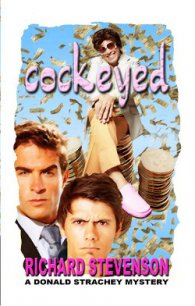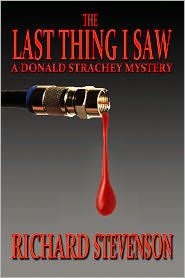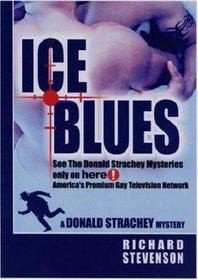On the Other Hand, Death - Stevenson Richard (книги без регистрации полные версии TXT) 📗
The weather forecast was for a hot and humid Sunday, followed by a hot and humid Sunday night, and then a hot and humid Monday. I switched over to WMHT, which had on a Schubert octet.
"Armed and considered dangerous." Bowman was having a lovely time.
And yet, something was not right. Before I'd left the Fisher farm I wakened Dot and told her what had happened. She said simply but firmly, "I do not believe it. It isn't true. Fenton would not cheat you or me. Perhaps his
judgment has been bad, but his principles are unbending. If he ever stole, it would be from the people he considered to be his enemies. And Peter steal? Oh, my stars, what silliness! No. What you're telling me is all stuff and nonsense, and you should know it!"
Should I? Or was Dot Fisher so sweetly naive that her schoolmarm's imagination was incapable of absorbing an act so cynical as the one Fenton McWhirter now stood— thanks to me—accused of. Dot had met bitterness in her life, and stupidity and small-mindedness, but not, so far as I knew, desperate cunning. If she had never seen it, how could she recognize it?
On the other hand, Dot had spent most of her life among children, who can be as sophisticated in their treachery as the Bulgarian secret police. Maybe she did know cunning when she saw it, and she had not seen it in McWhirter.
And, there was yet another troubling matter: If McWhirter had staged the kidnapping, then who was this third party in the affair, the man who had written the notes, mailed the finger, and then called McWhirter from the pay phone in Menands? The ransom notes had been in neither McWhirter's nor Greco's handwriting; I'd checked that when I went through their belongings. And the voice on the tape had not been Greco's. I knew that because it was another voice I was certain I had once heard. Somewhere. Sometime. Briefly. I tried again, but I couldn't bring it back.
A local co-conspirator? Or were Dot's instincts sound, and I was missing something again, ignoring the obvious for the seemingly obvious. Crane Trefusis? Maybe. But Dale Overdorf, his thug-about-town, had not been . . .
My mind shut down. I'd had enough for a few hours. More than enough. I wanted only to sleep.
I stopped at my office, phoned Bowman, and said I'd
had second thoughts. I summarized them. I said I was nearly certain that McWhirter and Greco were not conning us all, gave my reasons, and said that both of them were probably in trouble now. I urged him to do something about it. He said he would consider my ideas after he napped for a couple of hours. I understood.
I drove over to Delaware. At the apartment, Timmy's car was not in his space. Nor was it in anyone else's, nor in Visitor Parking. I looked for the rental car he'd had but couldn't spot it either.
The apartment was airless, silent, dead. I wrenched open a window. I put some Bud Powell on the turntable but never got around to switching on the amplifier.
The bed hadn't been slept in. Or had it? He might have changed the sheets. I checked the hamper for dirty sheets. Two were in there—folded, naturally, probably in triangles, like the flag in repose. They could have been in there for days, though. I didn't know. Laundry was his job, not mine. Whenever the subject of household chores came up—had come up—I'd say, "You wash and clean, and I'll keep the windmill oiled and the hogs fed." A cushy deal I had. Had had.
His clothes were in their assigned places in closets and drawers, his luggage stacked beside the vacuum cleaner in the "pantry-ette." I searched for a note, a message on a mirror, a letter(-bomb), and found none.
In the bathroom the towels and washcloths were fresh and symmetrically arrayed, as at the Ritz-Carlton. His four varieties of shampoos and conditioners were lined up along the end of the bathtub: Maxine, Patti, LaVerne and—Zeppo.
Only his toothbrush and Aim were missing. Mister Sweetmouth. Mister Oral Hygiene. Clean Callahan, the Germ-Free Child.
I went back to the bed, fell onto my side of it, lay
staring at the ceiling for thirty seconds, or half an hour. And then slept.
The ringing sound went on and on for days, weeks, months, and when I realized that it was not in my dream I reached out, snatched up the receiver from the bedside phone, and placed it in the vicinity of my head. A mighty act of will enabled me to focus on the alarm clock, which read two thirty-five. I knew it had to be p.m., because fierce sunlight fell across my legs, roasting them inside the khakis I still wore.
The caller was not Timmy. It was Dot Fisher, speaking in a trembling, tearful, frightened voice. She told me that Peter Greco was dead.
18
• I met Bowman at his Second Division Headquarters office in the South End. The place looked and smelled like the old school textbook warehouse in the New Jersey town where I grew up, but instead of moldy books about Charlemagne's horse it was full of shiny new gunmetal gray desks, chairs and shelving, no doubt purchased at a 300 percent markup from one of the mayor's cronies. Albany was still back in the 1870s in that respect, as in others.
"This thing is starting to get me down, Strachey. Christ."
He'd slept on a cot in his office. A half-eaten Danish lay on a pile of papers on his desk, and he sipped at some oily black stuff in a foam cup.
"When did they find him?"
"About noon. A family out in their Chris-Craft spotted
him floating by a piling under the Dunn Bridge. The police boat brought him in."
"Cause of death?"
"Dunno yet. The coroner's office has him now. Preliminary says asphyxiation, but that's unofficial, not to be repeated. Anyway, that can mean a lot of things. Guy falls into a baloney machine and half the time the coroner will point to his remains wrapped in little plastic packages on the luncheon meat shelf at Price Chopper and say, 'That man there died from asphyxiation.' Once in a while an autopsy comes in on the money. Depends on who's doing it."
"When will you get a report?"
"Six o'clock, seven."
"Are you sure it's Greco? Who identified him?"
"Mrs. Fisher."
"Well, Jesus. I would have done it."
"She knew him best."
"What about McWhirter? Has there been any sign of him?"
"Just the car he'd been driving. Mrs. Fisher's. We found it about an hour ago in the V.A. hospital parking lot. I've got two men going over it."
I examined the dirty swirl of rainbow in his coffee cup. "This stinks. It is rotten. Loathsome."
"Uh-huh."
"It is also baffling. I don't understand it. At all."
"That it is, Strachey. You said it. And now I am going to tell you why I asked you to come down here."
Now it was coming. I leaned back.
"The Albany Police Department has officially requested your assistance, Donald M. Strachey, because," he said, trying to look pompous, "I have reason to believe that you are withholding information regarding a criminal matter. You held out on me once, Strachey, but you will
do it again only at the risk of revocation of your New York State private investigator's license. Now. What else do you know about this goddamn rat's nest?"
I tried hard not to think about Peter Greco lying cold on the medical examiner's table, his bright eyes blank, and for the next half hour I described yet again my involvement in the case from the very beginning. My mind kept drifting back to Greco—had my distracted ineptitude helped cause his death?—but I concentrated hard, and I told Bowman everything I had seen and learned, how I had learned it, and the tentative or not tentative erroneous conclusions I had drawn at various points along the way. I left out only a little: all my contacts with Lyle Barner; my causing an ex-cop to become inebriated in the Hilton bar; the name of my San Francisco contact.




